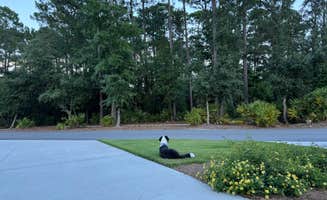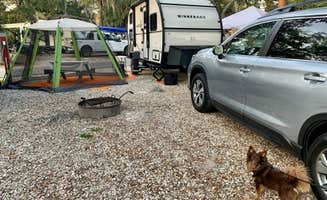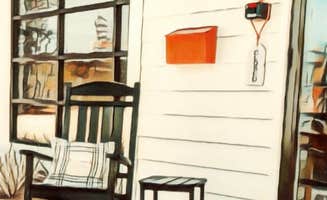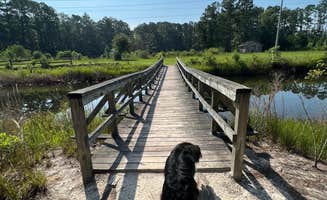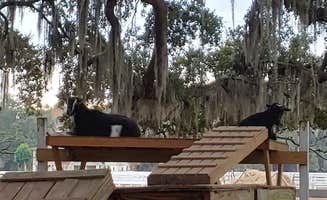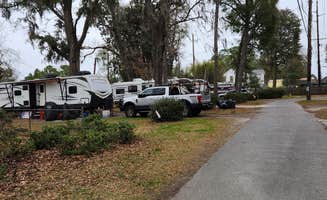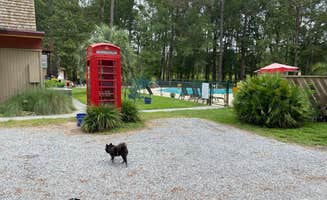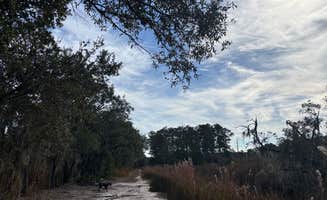Camping near Hilton Head Island is accessible year-round with an average of 215 sunny days annually, making it ideal for outdoor exploration in South Carolina's coastal environment. Winter temperatures rarely fall below 40°F, while summer highs average 88°F with significant humidity. Inland campgrounds often provide better protection from coastal winds that can reach 15-20 mph during afternoon sea breezes.
What to do
Fort exploration: Take a short drive to Fort McAllister State Park where historical structures provide educational experiences for all ages. "We planned this trip to coincide with the annual Civil War reenactment of Sherman's last battle on his way to the sea. It was our first reenactment and was interesting," shares William N. from Fort McAllister State Park Campground.
Wildlife observation: Wake early to see native species active in morning hours. "We were able to spot dolphins, manatees and stingrays from the dock here at the resort," explains Stuart K. at Hilton Head Harbor. Many campers report most active wildlife viewing occurs between 6-8am before beaches become crowded.
Shelling expeditions: Search Hunting Island beaches during low tide for unique finds. "Shelling was incredible-especially if you walk towards the inlet around low tide," recommends Katie F. from Hunting Island State Park Campground. Shell collecting is permitted for personal use but limited to reasonable quantities.
What campers like
Natural surroundings: Lush landscapes with Spanish moss create distinctive camping environments. "It is a great value. Deer and other wildlife are seen every day," explains Pamela I. at Skidaway Island State Park Campground. The park maintains 3+ miles of hiking trails through maritime forests.
Off-peak season visits: Fall and spring offer reduced crowds and pleasant temperatures. "We had a 70 degree day and with the ocean breeze sifting through the trees it felt like our jungle hike was air conditioned. No bugs. It was perfect," notes Neil T. about Hunting Island State Park. Most campgrounds report 30-50% lower occupancy during October-November and March-April.
Bike-friendly infrastructure: Extensive trail systems allow for car-free transportation. "It's huge, but feels very homey because of the layout and beautifully lush landscaping. The sites are incredible. Spacious, level, immaculate and private. The location is perfect...accessible to everything. We rode our bikes to the beach, the marina, restaurants, Starbucks, Publix, shops, etc," shares Susan & Kevin W. about camping at Hilton Head Island.
What you should know
Insect preparation: Coastal bugs can be intense depending on season and location. "One thing we didn't expect, even in Savannah in December, was mosquitoes," reports William N. at Fort McAllister. Most campers recommend DEET-based repellents specifically for no-see-ums which peak during dawn and dusk hours.
Storm awareness: Weather patterns can change quickly in coastal areas. "We did have some torrential rain our first night, but the puddles didn't drain after 4 days," explains Kristen S. about Hunting Island. Many campgrounds have limited drainage in certain sections, so requesting higher elevation sites can be beneficial during rainy seasons.
Limited fire options: Some premium resorts restrict traditional campfires. "One huge bummer is that none of the sites have a fire ring, which seems like a basic thing, especially at a luxe location like this," notes Stuart K. about Hilton Head Harbor. Alternative options include propane fire pits which are generally permitted where wood fires are not.
Tips for camping with families
Playground access: Choose campgrounds with dedicated play areas for children. "The kids enjoyed the beach, although it was too cold to swim and the algae bloom bubbles were abundant. Good COVID precautions all around!" shares Molly F. about Tuck in the Wood Campground. This campground "has a nice playground for the kids along with a super duper water slide," according to Terri M.
Educational opportunities: Incorporate learning experiences into your stay. "Really nice campground. Great hikes. Very close to a Publix and two convenience stores. My kids loved the playground and the fort tour!!" reports Tyler W. about Fort McAllister State Park. Junior Ranger programs are available at most state parks with activity booklets typically costing $3-5.
Safety considerations: Plan for wildlife encounters with clear family guidelines. "Excellent place to visit. This place is wild with all the driftwood, palm trees and butterflies. The beach was never crowded and is very dog friendly," states Cathy C. about camping near Hilton Head. Remind children to maintain distance from alligators (minimum 15 feet) which are common in local waters.
Tips from RVers
Site selection strategy: Research specific site numbers for optimal positioning. "We were in a 30 foot 5th wheel and stayed in site 95. In my opinion it was one of the best sites there. Nice size and lots of vegetation surrounding," recommends Brenda L. at Hunting Island State Park. Similarly, Stuart K. suggests, "IMHO the best sites are those located right on the lake and include sites like #14, #31– #38 and #39 – #47" at Lake Jasper RV Park.
Dog friendly campgrounds near Hilton Head Island offer varied amenities for pets. "We did take our Maltese and he ended up needing a bath so my girls took him to the dog wash area which they said was set up like a groomers shop. They also had a fenced in dog park area," shares Ashley W. about Hilton Head National RV Resort, which features "a HUGE dog park with three pet wash stations."
Water and electrical considerations: Check hookup locations before arrival. "Water is very close to front make sure you have enough hose," advises Kevin A. about Edisto Beach State Park. Most sites require 25-50 foot hoses and 30-50 amp electrical connections depending on the campground.




